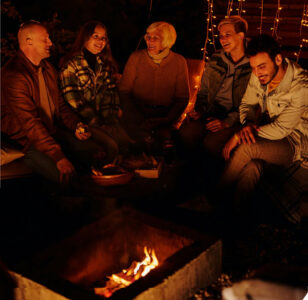Words and God’s Word ‘We’

By Fr Tom
Ryan SM
Part 8 of 10
Guided by the Short Course in Human Relations noted earlier in this series, we now arrive at two letters, namely, ‘we’—chosen as the most important word.
Let’s try to tease out why that might be so. You step out to cross the street and a hand grabs your arm and pulls you back. You did not see the approaching car, but they did. A stranger.
Consider solicitor Brendan Keilar in 2007—a father of three. He and a backpacker rushed to help Kaera Douglas as she was being dragged from a taxi in William St, Melbourne during the morning rush hour. Keilar was shot dead; the backpacker was seriously injured.
The German philosopher Arthur Schopenhauer pondered such phenomena in a paper The Foundations of Morality.
How is it that a human being can so participate in the danger of another, that forgetting his own self-protection, he (or she) moves spontaneously to the other’s rescue?
Schopenhauer’s reply is that this instinctive response wells up from the very core of our being:
It is a metaphysical impulse that is deeper than the experience of separateness. You realise you and the other are one.
It’s as if we’re hard-wired for being part of a group: we all have an inbuilt need to belong; plus, some sense of being responsible for others and their well-being.
In other words, it seems we’re born that way. Think of the first hours and days of a newly born baby—all of us at one stage!
Through a baby’s eyes:
“What a strange, new world. I feel so warm when Mum feeds and holds me. I love her scent. It’s great to be cuddled by her and Dad. There are lots of smiles, people pulling funny faces and gooey talk; not sure quite what that all means but it certainly makes me feel good. Everyone seems very happy to have me around!”
So, a little infant’s sense of being ‘me’ begins with those experiences of being welcomed, loved, of belonging—one with others.
Why? The infant picks up a message: “if they like having me around so much, then there must be something really nice about me.” The baby starts to have a sense of being a ‘me’, a self, because of being appreciated and loved.
But what about ‘we’ and God?
God’s Word: All in the Family
Think of Jesus’ words in the Gospels
“There are many rooms in my Father’s house” (Jn. 14:2).
“I have called you friends” (15:15).
The Master of the household sits his faithful servants down at table “and waits on them” (Lk 12:37).
Consider how often Jesus speaks in terms of his family; how we are called to share in his life, in the life of the divine family, the Trinity?
Sharing the table of the Eucharist is a sign of that promise to be fulfilled for us in the future.
Importantly, it is a sacramental presence that makes that reality present and active in our daily lives now.
Fellowship with the Father, Son and Spirit, with the human family and all creation is both an invitation and a task. We respond to that call with the attitudes and actions that nourish right relationships.
Each of us, then, is a self who is created in, and made for, relationships—in their various forms.
‘We’, then, is most important but it is not everything; not to the extent that the individual (‘I’) has no importance at all.
‘We’ is not meant to justify jackboots trampling over people—whether it be in the name of the state, the government or the nation.
Rather, God’s way is one of mutual obligation and service between myself and the community.
 A concluding thought.
A concluding thought.
Thérèse of Lisieux, to capture her desire for heaven, refers to the Trinity in terms of the ‘fire’ or ‘furnace’ of divine love. The English translation does not quite capture the original word in French ‘foyer’. This can mean, as in English, an entrance area, a vestibule in a house or office. In French, it can also denote the domestic hearth.
For Thérèse, ‘foyer’ evoked a glowing domestic hearth or fireplace with all the family gathered around it.
Imagine the scene: a cold winter evening, people making toast over the open fire, sipping hot soup, savouring the mulled wine— the play of light and shade from the flames on the surrounding faces.
Think of the rich associations: warmth, security, peace, nourishment, joy and, most important of all, the sense of belonging.
Visitors arrive. There is a warm welcome. They are given soup and toast. There is shuffling to make room for the guests.
This is the God of the Trinity’s family – where there is always space for another, and another, and another…. and, in fact, for all of creation.
Next month: the least important word— ‘I’.
 Entries(RSS)
Entries(RSS)